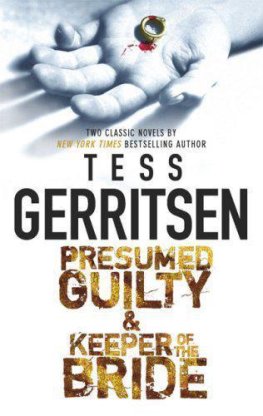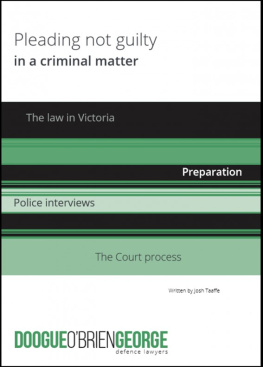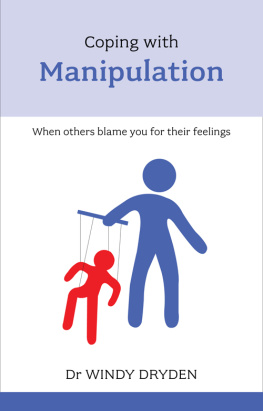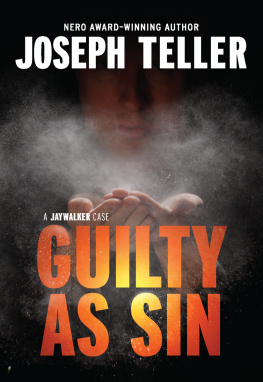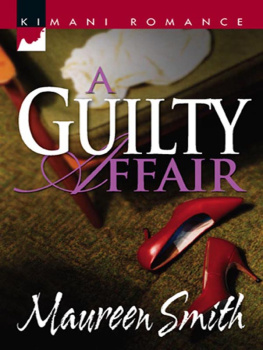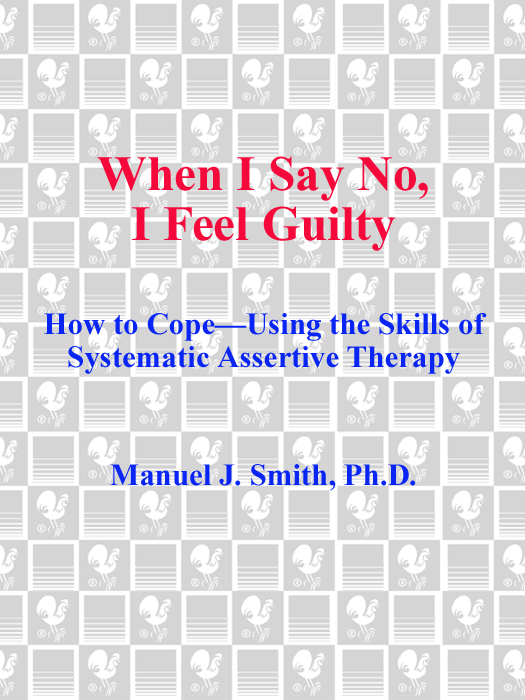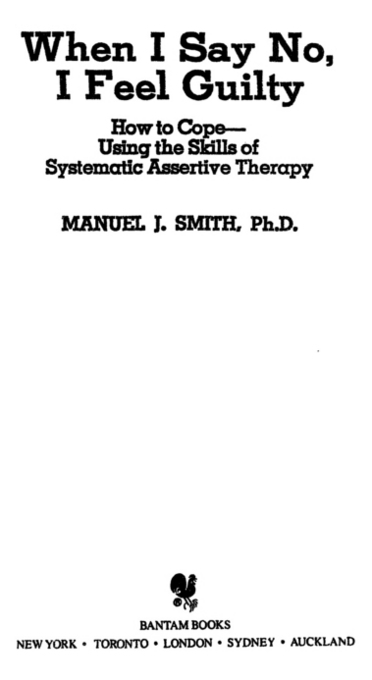A BILL OF ASSERTIVE RIGHTS
I: You have the right to judge your own behavior, thoughts, and emotions, and to take the responsibility for their initiation and consequences upon yourself.
II: You have the right to offer no reasons or excuses for justifying your behavior.
III: You have the right to judge if you are responsible for finding solutions to other peoples problems.
IV: You have the right to change your mind.
V: You have the right to make mistakesand be responsible for them.
VI: You have the right to say, I dont know.
VII: You have the right to be independent of the goodwill of others before coping with them.
VIII: You have the right to be illogical in making decisions.
IX: You have the right to say, I dont understand.
X: You have the right to say, I dont care.
YOU HAVE THE RIGHT TO SAY NO,
WITHOUT FEELING GUILTY
Bantam Books of Related Interest
Ask your bookseller for the books you have missed
CHANGE YOUR MIND, CHANGE YOUR LIFE by Gerald Jampolsky
FIRE IN THE BELLY: ON BEING A MAN by Sam Keen
IF YOU MEET THE BUDDHA ON THE ROAD, KILL HIM! by Sheldon Kopp
LOVE IS THE ANSWER by Gerald Jampolsky
MEN WHO HATE WOMEN AND THE WOMEN WHO LOVE THEM by Susan Forward
PASSAGES by Gail Sheehy
THE POWER OF YOUR SUBCONSCIOUS MIND by Dr. Joseph Murphy
HONORING THE SELF by Nathaniel Branden
HOW TO RAISE YOUR SELF-ESTEEM by Nathaniel Branden
THE SIX PILLARS OF SELF ESTEEM by Nathaniel Branden
NOT ONE WORD HAS BEEN OMITTED.
WHEN I SAY NO, I FEEL GUILTY
A Bantam Book / published by arrangement with
The Dial Press
PUBLISHING HISTORY
Dial Press edition published January 1975
Bargain Book Club edition / December 1974
Literary Guild Book Club edition / June 1975
Bantam edition / November 1975
All rights reserved.
Copyright 1975 by Manuel J. Smith
No part of this book may be reproduced or transmitted in any form or by any
means, electronic or mechanical, including photocopying, recording, or
by any information storage and retrieval system, without permission in writing
from the publisher.
For information address: Bantam Books.
eISBN: 978-0-307-78544-2
Bantam Books are published by Bantam Books, a division of Random House, Inc. Its trademark, consisting of the words Bantam Books and the portrayal of a rooster, is Registered in U.S. Patent and Trademark Office and in other countries. Marca Registrada. Bantam Books, 1540 Broadway, New York, New York 10036.
v3.1_r4
To Mankind,
the one animal species
I truly care about,
and its following members:
Dennis
Evelyn
Fred
Gladys
Hal
Ian
Irv
Jennie
JoAnn
Joe
Mannie
Phil
Sue
and
The Turk
The author wishes to acknowledge the work of Dr. Bruce Leckart towards formulating the concepts and writing the first draft of this manuscript.
Preface
The theory and verbal skills of systematic assertive therapy are a direct outgrowth of working with normal human beings, trying to teach them something about how to cope effectively with the conflicts we all have in living with each other. My initial motivation for developing a systematic approach for learning to cope assertively began with my appointment as a Field Assessment Officer at the Peace Corps Training and Development Center in the hills near Escondido, California, during the summer and fall of 1969. During this period, I observed with dismay that the traditional techniquesfancifully known as the armamentariumof the clinical psychologist (or of any theraputic discipline for that matter) were quite limited in that training setting. Crisis intervention, individual counseling or psychotherapy, and group process including sensitivity training or growth-encounter group methods did little to prepare relatively normal Peace Corps trainees for coping with the everyday human interaction problems that most veteran volunteers had met overseas in their host countries. Our failure to help these enthusiastic young men and women became apparent after twelve weeks of intensive training and counseling when, for example, they were given their first dry-run demonstration of a portable insecticide sprayer. Squatting on their heels in a dusty field to simulate a group of rural Latin American farmers were a motley bunch of PhDs, psychologists, a psychiatrist, language instructors, and veteran volunteers dressed in straw hats, shorts, sandals, GI boots, tennis shoes, or bare feet. As the trainees proceeded with their field demonstration, the ersatz farmers showed little interest in the insecticide sprayer and great interest in the strangers coming to their village fields. While the trainees could adequately answer questions on agronomy, pest control, irrigation, or fertilization, not one gave a believable answer to questions that the people they wanted to help would probably ask first: Who sent you down here to sell us this machine? Why do you want us to use it? Why do you come all the way from America to tell us this? Whats in it for you? Why do you first come to our village? Why do we have to grow better crops? And so forth. As each trainee tried, in exasperation, to talk about the insecticide sprayer, the ersatz farmers kept asking questions about the trainees reasons for coming to them. Not one trainee, as I recall, assertively responded with something like: Quien sabe Who knows the answers to all your questions? I dont. I only know that I wanted to come to your village and meet you and show you how this machine can help you grow more food. If you want to grow more food, maybe I can help you. Without such a nondefensive attitude and assertive verbal response when they found themselves in the indefensible position of being interrogated for suspicious motives, most of the trainees had an unforgettable, embarrassing experience.
While we had taught them adequate language, cultural, and technical skills, we had not prepared them at all for assertively and confidently dealing in public with a critical personal examination of their motives, wants, weaknesses, even their strengthsin short, an examination of themselves as persons. We had not taught them to cope in a situation where the trainee wanted to talk about agronomy and the ersatz farmers (as the real campesinos would) wanted to talk about the trainee. We had not taught them how to respond in such a situation because we didnt then know what to teach them. All of us had vague ideas about the situation but none of us helped much. We did not teach the trainee how to assert himself without having to justify or give a reason for everything he does or wants to do. We had not taught the trainee how to say simply: Because I want to and then leave the rest up to the people he was going to try and help.
In the few weeks remaining before they took their oaths and departed, I experimented with all sorts of theraputic training variations and improvisations with as many of the trainees as were receptive. As the final week drew nearer, the number of trainees who avoided me grew. None of the ideas off the top of my head showed any results then or even any promise, but I did make one important observation: the trainees who coped least well with critical personal examination behaved, in dealing with other people, as if they could not admit failurethey seemed to feel they had to be perfect.




